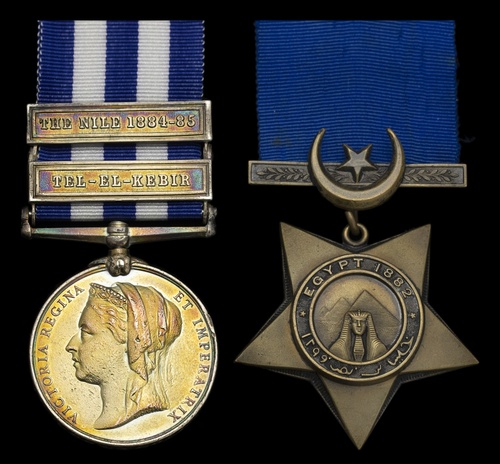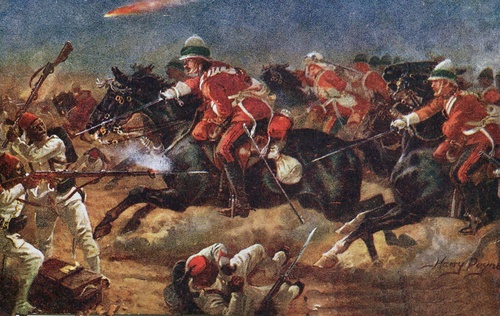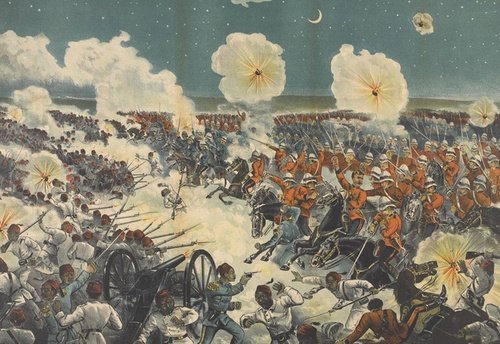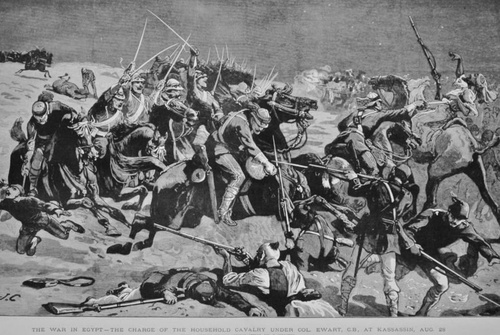Auction: 24003 - Orders, Decorations and Medals
Lot: 245
(x) Pair: Trooper W. H. Potter, 1st Life Guards, who famously launched the Moonlight Charge at Kassassin and later took part in the Battle of Tel-El-Kebir before joining the Gordon Relief Expedition
Egypt and Sudan 1882-89, dated reverse, 2 clasps, Tel-El-Kebir, The Nile 1884-84 (912 Tpr. W. H. Potter. 1st Life Gds.); Khedive's Star 1882, unnamed as issued, edge bruise, heavy pitting, suspension slack, nearly very fine and rare (2)
There are only two dated Egypt and Sudan Medals to the unit with this clasp combination.
109 Tel-El-Kebir clasps and 45 Nile 1884-85 clasps to the 1st Life Guards.
William Henry Potter was born at Sutton, Surrey in 1860, the son of Henry and Sarah Potter of Cranleigh, Surrey. He enlisted with the 1st Life Guards in 1879 and was with them during the Anglo-Egyptian War of 1882. Queen Victoria decided that a force of her Household Cavalry should join the expedition and it was decided that one Squadron each of the 1st Life Guards, 2nd Life Guards and the Royal Horse Guards should join. Potter was one of those whose Squadron was selected, them making his one of 149 dated medals to the Regiment.
Arriving in Egypt on 21 August, the British seized the railway junction of Nifshia and found their enemy dug in along Tel el-Maskhuta. The British artillery hammered them until they withdrew, while the Household Cavalry advanced close on the heels of the retreating enemy. They came upon the Egyptian Camp at Kassassin and took it by surprise, scattering the enemy and securing the canal.
The rest of the Brigade arrived and found themselves confronted by an Egyptian counter-attack in strength on the evening of 28 August. Under-strength it was uncertain that they could hold out, however as night fell the enemy were seen to retire, with their artillery opening up a heavy bombardment to cover the retreat. At this moment, the plain before Kassassin was illuminated by a clear moon and the Household Cavalry attacked from the right flank. The enemy withdrawal turned into a rout with some sources stating that they made it through their lines and to the guns, Kassassin was saved and the British advanced onwards.
Further attacks were beaten off and the British grew in strength before advancing against the Egyptian defences at Tel-El-Kebir. The infantry seized the Egyptian defences in a textbook dawn assault, driving them into the open where the cavalry division, having swung wide, swept in to ride them down. Their actions there completed the victory and scattered the Egyptian Army, ending the campaign.
Potter remained with the Life Guards and was to return to Egypt with them in 1884 as part of the detachment of 47 men selected to join the Gordon Relief expedition. Most of these men had Egypt experience, they were also excellent shots however like the rest of the land column they struggled to adapt to riding camels.
In the event, 39 of them saw action at Abu Klea and Potter was not one of them. He left Egypt and did not return, retiring in 1891 and appearing on the 1901 census as a patient at St. Bartholomew's Hospital. He became a house painter and remarried, settling in Sutton in 1911.
Potter lived for a long time and appears to have become extremely unwell by 1936. He either fell or jumped in front of a train at Sutton, apparently telling one of his rescuers: 'I have been a bit quear lately and I seemed to go all at once.'
He was found to be suffering from bronchitis and while in hospital for his injuries he died, apparently from complications surrounding bronchitis rather than the injuries from the train which were minor.
Potter's son Victor served with H.M.S. Hawke, and was killed when she was sunk on 15 October 1914. They had been sunk by U-9, the same U-boat responsible for the action of 22 September; sold together with copied research including medal rolls, service papers, census data and a newspaper extract.
Subject to 5% tax on Hammer Price in addition to 20% VAT on Buyer’s Premium.
Sold for
£520
Starting price
£320











